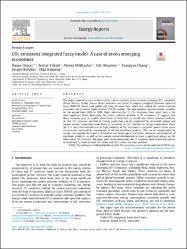| dc.contributor.author | Dinçer, Hasan | |
| dc.contributor.author | Yüksel, Serhat | |
| dc.contributor.author | Mikhaylov, Alexey | |
| dc.contributor.author | Muyeen S.M. | |
| dc.contributor.author | Chang, Tsangyao | |
| dc.contributor.author | Barykin, Sergey | |
| dc.contributor.author | Kalinina, Olga | |
| dc.date.accessioned | 2023-05-26T12:19:42Z | |
| dc.date.available | 2023-05-26T12:19:42Z | |
| dc.date.issued | 2023 | en_US |
| dc.identifier.citation | Dinçer, H., Yüksel, S., Mikhaylov, A., Muyeen S.M., Chang, T., Barykin, S. ... Kalinina, O. (2023). CO2 emissions integrated fuzzy model: A case of seven emerging economies. Energy Reports, 9, 5741-5751. https://doi.org/10.1016/j.egyr.2023.05.008 | en_US |
| dc.identifier.issn | 2352-4847 | |
| dc.identifier.uri | https://doi.org/10.1016/j.egyr.2023.05.008 | |
| dc.identifier.uri | https://hdl.handle.net/20.500.12511/10980 | |
| dc.description.abstract | This paper proposes a new model to study carbon emission issues in seven emerging (E7) economies (China, Mexico, Turkey, Russia, Brazil, Indonesia and India). It employs weighted Quantum Spherical fuzzy DEMATEL model with golden cut using 18 years data, which was ranked for carbon emission evaluation via Quantum Spherical fuzzy TOPSIS method. The data includes macroeconomic variables for the period from 2003 to 2020. Paper observes that (i) CO2 emissions from fossil fuels is the most significant factor distressing the carbon emission problem of E7 economies. It suggests that these countries need to explore alternatives to fossil fuels to handle the carbon emission problem. (ii) The CO2 emission problem in energy production can be minimized by renewable energy and nuclear energy, suggesting some financial incentives to the investors in energy explorations areas. (iii) It is also observed that due to high volatility of CO2 emissions, a negative market factor exists in consumer sentiment in consumption of oil and petroleum products. This can be compensated via energy consumption fiscal policy in taxation and encourage of extractive industries and producers of petroleum products, as well as the uneven spatial development to have a significant impact on the reduction of CO2 emission. The paper gives recommendation that E7 countries need to find alternatives to fossil fuels in order to deal effectively with the carbon emission problem. | en_US |
| dc.description.sponsorship | Qatar National Library ; Russian Science Foundation | en_US |
| dc.language.iso | eng | en_US |
| dc.publisher | Elsevier Ltd | en_US |
| dc.rights | info:eu-repo/semantics/openAccess | en_US |
| dc.rights | Attribution 4.0 International | * |
| dc.rights.uri | https://creativecommons.org/licenses/by/4.0/ | * |
| dc.subject | CO2 Emission | en_US |
| dc.subject | Emerging Economies Model | en_US |
| dc.subject | Fiscal Policy | en_US |
| dc.subject | Quantum Spherical Fuzzy | en_US |
| dc.subject | Taxation | en_US |
| dc.subject | TOPSIS Method | en_US |
| dc.title | CO2 emissions integrated fuzzy model: A case of seven emerging economies | en_US |
| dc.type | article | en_US |
| dc.relation.ispartof | Energy Reports | en_US |
| dc.department | İstanbul Medipol Üniversitesi, İşletme ve Yönetim Bilimleri Fakültesi, Uluslararası Ticaret ve Finansman Bölümü | en_US |
| dc.authorid | 0000-0002-8072-031X | en_US |
| dc.authorid | 0000-0002-9858-1266 | en_US |
| dc.identifier.volume | 9 | en_US |
| dc.identifier.startpage | 5741 | en_US |
| dc.identifier.endpage | 5751 | en_US |
| dc.relation.publicationcategory | Makale - Uluslararası Hakemli Dergi - Kurum Öğretim Elemanı | en_US |
| dc.identifier.doi | 10.1016/j.egyr.2023.05.008 | en_US |
| dc.institutionauthor | Dinçer, Hasan | |
| dc.institutionauthor | Yüksel, Serhat | |
| dc.identifier.wosquality | Q2 | en_US |
| dc.identifier.wos | 001006374300001 | en_US |
| dc.identifier.scopus | 2-s2.0-85159497912 | en_US |
| dc.identifier.scopusquality | Q2 | en_US |



















